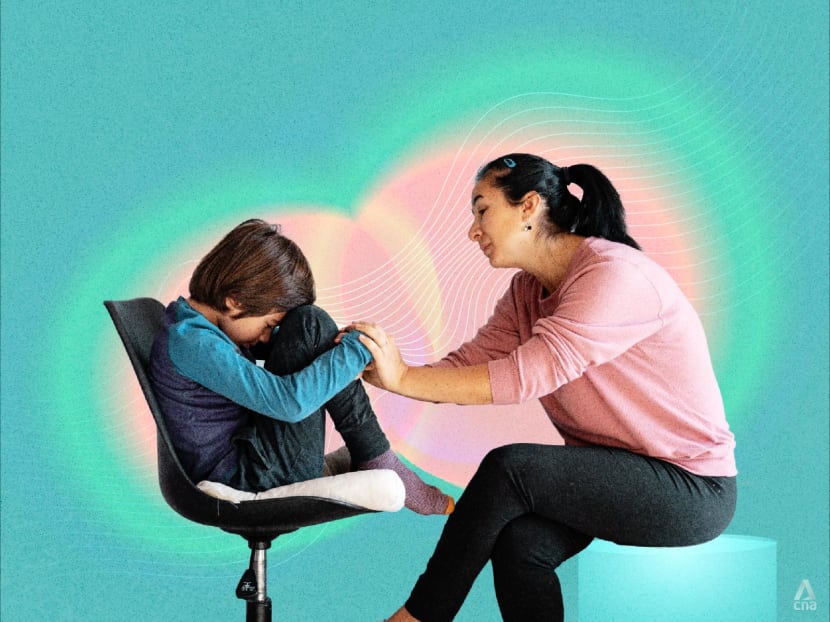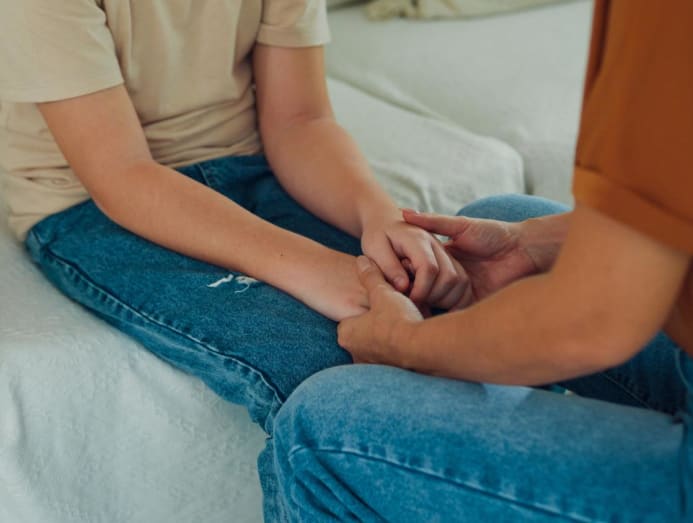I'm trying to be a 'gentle parent', but it's a lot tougher than I thought
Ms Nabilah Awang grew up in a family where there was a strict, fear-based form of discipline for the children. Now a mother of two, she's choosing a softer approach despite the daily challenges.

To avoid falling into the same traps and patterns that her parents had with her, a mother of two delved into the world of gentle parenting by reading books, listening to podcasts and watching TikTok videos with her children. (Illustration: CNA/Samuel Woo, iStock)

This audio is generated by an AI tool.
I was brought up with rather strict parenting – the kind where most discussions ended with "because I said so" and questioning authority would earn you a lengthy, often heated lecture.
Many of my friends had a similar upbringing. Our parents largely subscribed to the proverbial wisdom of "spare the rod, spoil the child". They genuinely believed that a strict, fear-based approach would turn us into well-behaved, successful adults.
With that, we as children learnt to bottle things up, blow up or, worse, shut down completely when our feelings became too overwhelming. We became people-pleasers, emotional avoiders or masters of silent rage-cleaning (this last one is me, honing in on cleaning things while feeling angry or frustrated).
So when I had my two boys, born just 11 months apart, I wanted to do things differently.
A few years ago, a moment of pure sibling chaos erupted in our household when my boys were fighting over a toy. I stormed in, eyes blazing and hands on hips. I raised my voice over the noise they were making, so loud that they froze and flinched.
And then I saw it – the fear in their eyes, not of the consequences, but of me.
In that moment, I realised that I was falling into the exact same traps and patterns as my own parents did.

From that moment on, I delved wholeheartedly into the world of gentle parenting, reading all the books, listening to all the podcasts and watching all the TikTok videos with my children.
It sounds beautiful in theory, the calm tones, mutual respect, co-regulation and empathy at the heart of the discipline. It is the kind of parenting you imagine happening in softly lit, beige-toned homes filled with Montessori toys, probably while you and your children are dressed in matching white linen outfits.
But practising it in real life is a whole different story, especially when you were not raised that way.
REWIRING YOURSELF
Contrary to some misconceptions, gentle parenting does not mean giving your kids a free pass for any and all sorts of behaviour.
To me, gentle parenting is similar to authoritative parenting, but with a softer edge.
We still need to set clear boundaries and expectations with our kids, but we do so with empathy, respect and open communication, rather than fear or control.
The hope is that the gently parented child would learn to recognise and control their emotions because the caregiver is consistently affirming that those feelings are important.
Hence, every gentle parenting technique starts with the parent learning how to self-regulate themselves and their emotions, which is much, much easier said than done.
Self-regulation sounds intuitive, but it is not something innate. It is a skill and one that must be taught and practised, like any other.
When we learn how to self-regulate, we can model how to keep cool when faced with big feelings or inconveniences. We are able to stay calm, think clearly and react with intention, even when we are running on caffeine and only three hours of sleep.
HARDER THAN YOU THINK
I wish I had learnt to self-regulate before I learnt how to swim or ride a bicycle. Now, as an adult, I would rather feel the pain of giving birth again than have to give deference to a child’s every mood, all while keeping my voice within the "gentle" threshold, just to get them to brush their teeth or put on their freaking shoes.
It doesn't come easily at all. A friend once asked me: "We're facing an economic crisis, a climate crisis, mental health issues and a million work deadlines. Why add this pressure to gentle parenting, too?"
And my answer was: Because I've seen it work.
One small but meaningful win came during a particularly stressful afternoon. I was on a Teams call at work, trying to sound like a competent professional, when my three-year-old marched into the living room and, right before my eyes, dumped an entire bowl of cereal onto the carpet.
My gut reaction: Yell. Scold. Lecture.
But instead, I muted my microphone and, as calmly as I could, told him that I was overwhelmed and asked if he could clean up the mess.
He looked up at me and, without missing a beat, said: "Okay, Mum. Do you need a hug or some space to breathe?"
I was stunned. This tiny human, covered in crumbs, had just offered me the exact compassion I'd been trying to model for him. It was one of those moments that made all the effort feel worthy.
BREAKING THE CYCLE
Honestly, I don't know if I'm making the "correct" choice. I don’t know what the long-term effects will be – my boys are still little.
However, I'm already starting to see a shift.
They come to me with their feelings. They know they are allowed to cry, to rage, to laugh, to be messy and human.
They call me out when I say things that are overly harsh or inappropriate. Sometimes, I apologise for hurting their feelings, sometimes they do for hurting mine.
Gentle parenting is also teaching me to pause and look for the reason behind the behaviour.
When kids act out, it is often because they are overwhelmed or disconnected. And when they defy you, it is often a plea for connection or autonomy (or sometimes just for snacks).
Don't get me wrong. It is still hard – so hard. But it helps to remind myself daily that my kids are learning how to handle their big emotions by watching how I handle mine.
Some days, I get it right. I pause. I validate. I hold the boundary with kindness. I sit beside my sobbing child and say, "I know this is hard. I am here. You are safe."
And then there are days when I lose it, when I snap over spilt milk and slam the fridge door just a little too hard. When I say something sharp, my child shrinks.
I can't be perfect. After all, I am just a sleep-deprived working mum-of-two trying her best.
But now, I notice. I apologise. And I try again.
Nabilah Awang is an editor specialising in commodity insights. She is a mother of two.












